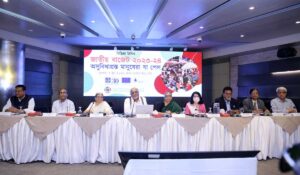
A media briefing titled ‘National Budgets in Bangladesh: Myths and Realities’ was held on Wednesday, June 7, 2023. The Centre for Policy Dialogue (CPD) and Citizen’s Platform for SDGs, Bangladesh, in cooperation with the European Union, jointly organised the event at the BRAC Centre Inn Auditorium, Mohakhali, Dhaka.
The dialogue was chaired by Advocate Sultana Kamal, Core Group Member, Citizen’s Platform, and Member, CPD Board of Trustees. Dr Debapriya Bhattacharya, Convenor, Citizen’s Platform and Distinguished Fellow, CPD, delivered the keynote presentation at the event.
Dr Dibalok Singha, Executive Director, Dustha Shasthya Kendra (DSK); Mr Samir Ranjan Nath, Programme Head, BRAC-IED; Dr Fawzia Moslem, President, Bangladesh Mahila Parishad, Professor Mustafizur Rahman, Core Group Member, Citizen’s Platform, and Distinguished Fellow, CPD; Dr Fahmida Khatun, Executive Director, CPD; Mr Towfiqul Islam Khan, Senior Research Fellow, CPD; Mr Asif Ibrahim, Core Group Member, Citizen’s Platform and Vice-Chairman, New Age Group and Industries were present as distinguished speakers.
Advocate Sultana Kamal, in her introductory remarks as the chair, emphasised on the Sustainable Development Goals (SDGs) main theme Leaving No One Behind (LNOB). Until 1975, it was said in Mexico that women as a gender were invisible. In the national budget FY2023-24, the LNOB seems quite invisible. It is evident that the poor people will be deprived of some rights.
During his contribution at the dialogue, Dr Debapriya Bhattacharya expressed that the first week following the declaration of the national budget for FY2023-24 was filled with various analyses, where the main concern was the allocation of funds. The presentation raised 10 critical questions explaining the myths and realities regarding the national budgets from an economic perspective. It highlighted issues such as inequality, fiscal measures, budgetary size and targets, dependency on indirect taxes for revenue generation, ADP composition, and acceptable allocation for SSNPs, health and education. Furthermore, the presentation questioned whether the budget was genuinely substantial. In addition to wealth inequality, the urban scenario has become increasingly unequal. The global median value of public expenditure (as a percentage of Gross Domestic Product -GDP) stands at 32.2 per cent, whereas in Bangladesh, it is merely 15 per cent. He raised the question, ‘In proportion to the volume of the economy, is the budget for FY24 actually ‘Big’?’ Since FY15, revenue mobilisation and public expenditure on the Annual Development Programme (ADP) appear to have declined due to a lack of democratic accountability. He also remarked that there are instances of money laundering and a failure to collect sufficient revenue. This raises doubts about the logical structure of this year’s budget. A society cannot be considered truly equal if it heavily relies on indirect taxes. Currently, the value-added tax (VAT) remains the same for everyone, and there is a lack of presence of property tax and inheritance tax, which are significant contributors to rising inequality. Additionally, the financing of ADP seems to rely heavily on foreign resources. Moreover, the GDP growth projection for FY24 appears to be vague. There are discrepancies in macro data between BBS and MoF, the market tilizes this, and inflation prevails. Moreover, the projection report for the exchange rate of per US dollar against local currency was set at BDT 104.0, whereas the current market rate is BDT 108.0. He also pointed out that agricultural subsidies and tax exemptions cannot be considered as part of the SSNP. CPD has classified SSNPs into three categories viz. acceptable (i.e., those that should naturally be included in the SSNP list), quasi-acceptable (i.e., those that fall somewhere in the ‘grey’ area) and non-acceptable (i.e., those that should be excluded from the list). This is overall not an election budget on the eve of the general election. The government speaks about the allocation, but it is not ensured by them whether the allocation is actually reaching beneficiaries which is a major concern for meeting the LNOB objectives. Regarding the revenue collection, CPD has welcomed some fiscal measures such as increasing the annual tax-free income threshold, increasing supplementary duty (SD) and applying prices on cigarette items, environmental surcharges, etc. But we have shown our concerns on the reformation of minimum BDT 2000 tax on every TIN holder (below taxable income), raising wealth surcharge threshold, increasing VAT on iron or steel for LPG cylinder, 15 per cent VAT on a ballpoint pen, VAT and supplementary duty on import of certain raw materials used in the production of sanitary napkins and diapers, etc. Finally, he emphasised the primary goal should be to ensure that economic transition is not hindered by political transitions, highlighting the importance of maintaining stability during political changes.
Mr Samir Ranjan Nath pointed out that in the current education budget allocation for primary, secondary, madrasa, and technical education is still deemed insufficient. In terms of the education budget, which encompasses both operating and development budgets, the development budget has worsened compared to the allocation of the previous fiscal year (FY23). The budget speech demonstrates a lack of concerns for the students coming from disadvantaged communities, it fails to address their specific needs. On the contrary, the ballpoints pens are burdened with a 15 per cent VAT, which is one of the most necessary education materials.
Discussing the health budget, Dr Dibalok Singha highlighted in Bangladesh, there is a severe shortage of healthcare professionals, contributing to a decline in the quality of healthcare services. The health budget faces an operating gap, and the development exposure is limited. A significant portion of the population is pushed below the poverty line due to excessive healthcare expenses. Budget allocation for health by at least 15 per cent, particularly focusing on marginalised individuals to pave the way for improved healthcare access for all.
Mr Towfiqul Islam Khan pointed out that the government has allocated more than BDT 1,16,000 crore for equity, loan to autonomous bodies and reserve, but could only allocate less than BDT 1,00,000 crore for safety net budget excluding pensions for public servants.
Dr Fawzia Moslem expressed her appreciation for the fact that the women’s budget received individual attention, though it is result of the long history of women movement. However, she noted that considering the ongoing inflation, the allocation for the women’s budget is insufficient. Additionally, she raised concerns about the VAT imposed on import of raw materials used in the production of sanitary napkins, she highlighted the importance of raising awareness on gender sensitivity in the structure of local government. She questioned the course of action if the 33 per cent representation target was not achieved.
Dr Fahmida Khatun highlighted that in the FY24 budget, the allocation for climate-related programmes within the SSNP accounts for only 6.7 per cent of the total SSNP budget. She expressed the need for increased allocation in this area and highlighted the importance of transparency in knowing where the funds are being directed. There are existing issues within the beneficiaries, targets, and implementation processes that must be addressed. The CPD executive director also highlighted that while the goal is to make electricity accessible to all at affordable prices, the rising fuel prices are affecting everyone right now. She pointed out that the International Monetary Fund’s (IMF) 11 climate-related reformation clauses are not adequately reflected in this fiscal year’s budget. She appreciated the government’s decision to impose a carbon tax on having the second vehicle, but more cycling parking spots need to be addressed since the government is talking about reducing carbon emissions.
Mr Asif Ibrahim raised his concerns about the increase in export tax. He expressed his opinion that there should be a compulsory tax imposed on companies such as Facebook, Google, and Amazon. The primary concern for the private sector is the generation of employment opportunities. He also emphasised the need for initiatives that aim to reduce corruption and implement investment-friendly policies. He also figured out the absence of any mention of the capital market in the budget speech, indicating a lack of attention to this important sector.
Professor Mustafizur Rahman, in his remarks, stated redistribution of wealth and income can be achieved through effective budgeting. The targeted timeline for ongoing projects and issues with carry-over projects are creating serious obstacles that affect the general population. Those responsible for carry-over projects should be held accountable, and social monitoring plays a vital role in this process. He emphasised the importance of focusing on actual data generation, as what cannot be measured and cannot be effectively monitored.
During the open-floor discussion, various questions were raised regarding the budget and its intentions, particularly in relation to the upcoming national polls. Lastly, the journalists asked if the budget is designed to be poverty-friendly.
Dr Debapriya concluded the session responding to the questions by highlighting the fact of receiving the loan from the IMF which is due to the ongoing deficit in revenue collection. Due to this, the government has presented a budget of revenue collection of which the major portion will come from the indirect taxes, while the poor and middle-income people will be negatively affected. Moreover, he also emphasised the discrepancies between setting the target and equal distribution. Further, he explained that the budget FY24 is not properly an election budget due to the lack of proper allocation of public expenditure in the respective sectors, and the new fiscal reformation that has given birth to certain debates such reformations are minimum BDT 2000 tax on every TIN holder, raising wealth surcharges etc. This will definitely impact the marginalised people in the country by raising inequality both in income and wealth consumption levels.


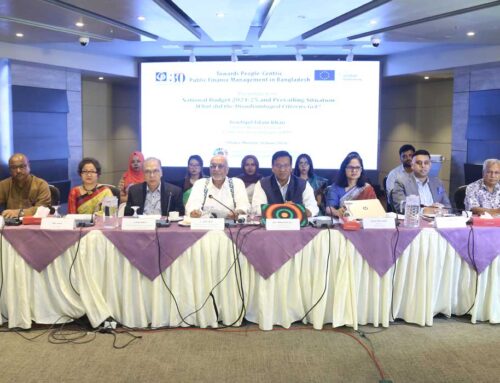
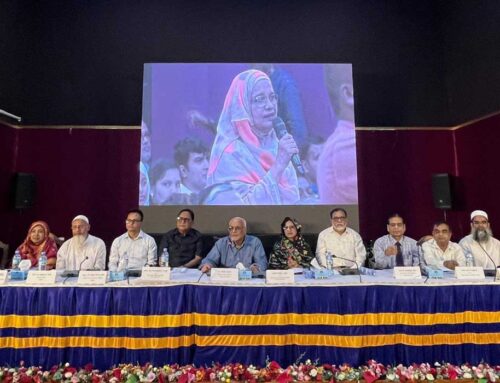
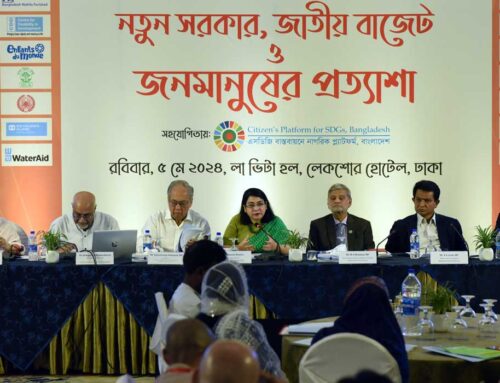
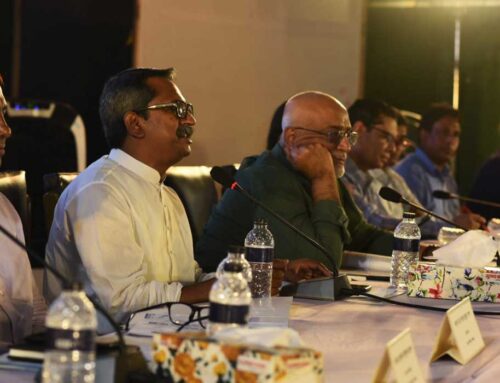
Leave A Comment